Peter MALONE
Saturday, 18 September 2021 19:24
Rent A Cop
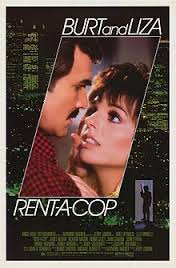
RENT A COP
US, 1988, 92 minutes, Colour.
Burt Reynolds, Liza Minnelli, James Remar, Richard Masur, John P.Ryan, John Stanton.
Directed by Jerry London.
Rent A Cop is an enjoyable, if routine, thriller. It has Chicago settings. It has a very good cast with Burt Reynolds as usual and a lively Liza Minnelli. (They had appeared together in Lucky Lady.) James Remar is, as usual, a menacing villain. Australian John Stanton is the heavy and there are guest appearances from Richard Masur, John P. Ryan as well as Dionne Warwick.
1. Enjoyable thriller, routine and familiar? The odd couple?
2. Chicago settings, the night in the city, hotels and mansions? Musical score?
3. Burt Reynolds and Liza Minnelli as the enjoyable odd couple? Strong cast?
4. Della and her work, the hotel, witnessing the, killings, in hospital, dancer's attacks on her? The encounter with Tony Church, deciding to hire him, their bickering? In the hotel, comic aspects of their relationship? Identifying Dancer? Her work on computers? Going for Beth's help? Trying to distract Alexander at the party? Captured by Dancer, the mansion, the massacre? The happy ending?
5. Church and his police background, security work, getting fired? With Wilson and the police officials? Contacts with Roger? Meeting Della, her hiring him, the bickering, the comedy? Lamarr and Pitts waiting outside? Getting them for back-up? Talking with Roger and his death? The chase, the fight. with Dancer? The happy ending?
6. Alexander and his empire, hiring Dancer, Roger as go-between, his henchmen, keeping cool, the confrontation with Dancer, his death?
7. Roger, the police, police corruption, interviewing Dancer about the money, the discussion in the restaurant with Church, ordered to kill him, his own death?
8. Dancer and his brutality, disguises, seeing Della, trying to kill her? His dancing, visit from Roger, confrontation with Alexander, taking Della, the final fight and death?
9. The police, the robbery, then many-deaths, Wilson and the officials (and his encounter with Della)?
10. Lamarr and Pitts, friends, stakeout? Lamarr and his friendship with Church? Pitts as the brash young man? The chases and their losing Church, the backup in the mansion? Killing Dancer?
11. Themes of crime, right and wrong? And the comic odd couple?
Published in Movie Reviews
Published in
Movie Reviews
Tagged under
Saturday, 18 September 2021 19:24
Remember?
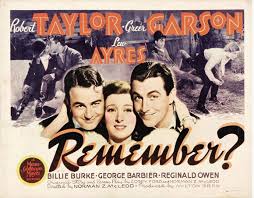
REMEMBER?
US, 1939, 83 minutes, Black and white.
Robert Taylor, Greer Garson, Lew Ayres, Billie Burke, Reginald Owen, Henry Travers, Laura Hope Crewes, Sig Rumann.
Directed by Norman Z. Mc Leod.
Remember? is a brief M.G.M. comedy of the late 1930s - remembered as the second film made by Greer Garson (after her debut appearance in Goodbye Mr. Chips). She is supported by Robert Taylor in a typical hero charming role and Lew Ayres once again as the other man. There is pleasing support from such a cast as Billie Burke, Reginald Owen, Henry Travers.
The plot is fluffy and even trivial, playing with the amnesia theme. Lew Ayres is about to get married to Greer; Robert Taylor sees her and sweeps her off her feet; they marry - with assorted jokes about the justice of the peace and a policeman accompanying them; they break up because he is always busy; they take a potion which makes them forget everything of the last six months; they meet again in similar circumstances and it all happens over. Typical material of '30s comedy - not exactly the screwball type from other studios, rather the more sedate M.G.M. style.
Of some interest as an example of '30s film-making - but more interesting for its place in Greer Garson's career.
Published in Movie Reviews
Published in
Movie Reviews
Tagged under
Saturday, 18 September 2021 19:24
Reincarnation of Peter Proud, The
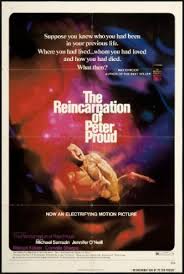
THE REINCARNATION OF PETER PROUD
US, 1974, 104 minutes, Colour.
Michael Sarrazin, Jennifer O'Neill, Margot Kidder, Cornelia Sharpe, Paul Hecht.
Directed by J. Lee Thompson.
Audiences should not expect the pros and cons of genuine reincarnation here, but rather a good thriller with reincarnation as its device for involving audiences in Peter Proud's quest for his previous identity. There is a chilling eeriness about the coming together of the jigsaw pieces and, especially, the ending. While the plot is somewhat predictable, it is well-enough paced to keep the audience interested and give a plausible enough basis for the film's reincarnation pre-supposition. Michael Sarrazin is Peter Proud, fearing for his sanity, tormented by his dreams, obsessed with his search. Margot Kidder is skilful in a complex role in both his lives.
1. What were the expectations from the title? The impact of the film as a thriller, about reincarnation? How enjoyable was the thriller content of the film?
2. Why was the film made? Did the film have any value as regards realism about reincarnation? How plausible was the presentation of reincarnation? Did the film make it credible? The background discussions about reincarnation? Does the film's success depend upon belief in reincarnation?
3. What were the best ingredients of the film as a thriller? The inevitability of Peter Proud's search? The initial opening and forebodings? The clues coming together? Marcia Curtis in both stories? The inevitable climax? How strong was the atmosphere of the film? The impact of the opening dreams and reality? The recurring dreams as a chorus? The detail of the house, the fight, the lake, the murder? The atmosphere of Peter's search? The details of the Massachusetts town? The inevitability that the previous story was real?
4. How much of the film's success depended on structure? The dreams and their fulfilment? The counterbalance of reality? The moving towards discovery of greater reality for Peter Proud? The finale and the repetition of fate?
5. How well visualised were the dreams, the background of the nature of the dreams? The physical and psychological research? The tests? The plausibility of Peter Proud's dreams? The nature of the symbolism? The creations of the unconscious imaginations? Did the dreams indicate reasons for reincarnation? The type of personality repeated from life to life?
6. How successful a hero for the film was Peter Proud; the background of his university work, the details of his life, his relationship with Nora, the fear of hallucinations, his feeling that he would break down?
7. Was the nature of his obsession credible? His relationship with Sam? The need for the search, the nature of the search and its impact? The greater discovery of meaning?
8. The importance of discovering Anne? (The psychological overtones of father and daughter and lover). The searching out of Marcia? The clash and the psychological conflict with her? The need to rid himself of her menace? The inevitability and pathos of his death? The final images?
9. What did the film have to say about fate, the inevitability of love and death? The meaning of life?
10. How evil a person was Jeff Curtis? The audience's visual impression? The newspaper background and people's gossip, the tennis club etc.? The possibility of vengeance by reincarnation? The same victimisation?
11. How well communicated was the personality of Marcia? Her social background, marriage with Jeff Curtis, her fears and horror of him, the fight, the rape, death? The remorse of her old age? Her drinking? Attachment to Anne? Her fears when it appeared that Peter Proud was something more? The inevitability of her killing her husband again? The importance of the flashbacks and the dreams for her characterisation?
12. The importance of Anne in the film? The father-daughter relationship, mother-daughter relationship?
13. The importance of the New England background? The contents of the dream, the details of the past and updated, the Puritan and heritage of backgrounds? The need for the exorcism in the place itself?
14. Characters of Nora and her supporting Peter yet withdrawing? Sam and his interests yet his wanting to exploit Peter?
15. Did the film have much more value than mere entertainment?
Published in Movie Reviews
Published in
Movie Reviews
Tagged under
Saturday, 18 September 2021 19:24
Reflection of Fear, A
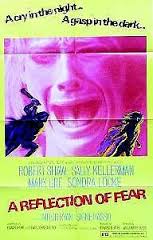
A REFLECTION OF FEAR
US, 1971, 89 minutes, Colour.
Robert Shaw, Sally Kellerman, Mary Ure, Sondra Locke, Signe Hasso.
Directed by William A. Fraker.
Reflection of Fear is a stylish thriller but no masterpiece; rather an exotic experience in atmospheric eeriness. Camerawork and colour are used in contrived ways to make the audience absorb the claustrophobic world of grandmother, mother and daughter, three women who live in baroque isolation in Canada. The solitary world of the daughter is broken by the return of her father and we soon have three murders and a quick resolution, cousin to "Psycho". A fine cast including Robert Shaw, Mary Ure, Sondra Locke, Signe Hasso and Sally Kellerman do more than justice to a film which would give strong support in a double programme.
1. The implications of the title? The use. of colour,, baroque and Gothic effects, claustrophobic atmosphere? How well were these used for the film? Was it a good psychological thriller? Or merely conventional and sensational? Why?
2. How well did the film focus on Marguerite? Was she an attractive character to the audience? Did the audience allow her her isolation and solitude, her talking to a friend and a horse? The eeriness of the atmosphere and its loneliness? Did the film suggest madness? Her preoccupation with studies botany etc.?
3. How was Marguerite a victim of her mother's and grandmother's world? The influence of mother and grandmother? The women in themselves and their relationship? Eerie and baroque? Isolated and man-fearing? Was there a love in this household? Julia's response to Michael's return and to Anne? The question of a divorce? The influence of the grandmother?
4. How did Michael and Anne compare in normality with this enclosed world? How well did the film portray the clash between normal and abnormal? Was the audience meant to have sympathy with Michael. and Anne? Or were they disruptive of the solitude world?
5. How did the wider outside world contrast with the home? How normal did it seem? How important was its representation to balance the solitude world?
6. What was Marguerite's reaction to her father's presence? Love? Mystery?
7. How did the clash between normality and abnormality cause disruption, especially the meeting at the gate?
8. Audiences prepared for the deaths? Did you suspect what happened? Why? Were the deaths appropriately brutal for this film? Over-brutal?
9. Were the investigation sequences important for the plot?
10. The importance of the motel-owner's son and his lust after Marguerite, the reality of his death? What motivated this? What insight did it give into the other deaths?
11. How successful, dramatically, was the attempt on Anne's life? Was it appropriately melodramatic or overdone?
12. What did the tone of the funeral and sadness add to the film? In preparation for the final revelation?
13. How sinister did Marguerite's talking with her friend become by the end of the film? Why?
14. was the audience prepared for the final revelation? Was it expected? What comment on the mad world did this revelation give? Insight into mother and grandmother, and their victimisation of Marguerite?
Published in Movie Reviews
Published in
Movie Reviews
Tagged under
Saturday, 18 September 2021 19:24
Red Tent, The
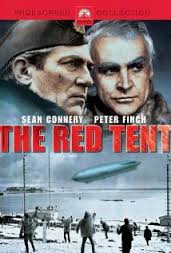
THE RED TENT
Russia/Italy, 1970, 119 minutes, Colour.
Peter Finch, Sean Connery, Claudia Cardinale. Hardy Kruger, Massimo Girotti.
Directed by Mikhail Kalatozov.
The Red Tent is a long epic about the ill-fated expedition of General Umberto Nobile to the North Pole in a balloon. The film is interesting and the photography well done, but somehow or other the film is not as alive as it ought to be. Perhaps the film is rather solemnly handled which makes it somewhat dull. Again, the structure of the film is unusual, in the form of flashbacks which start in the imagination of the aged Nobile and visualise the torments of his conscience - what he should have done in the rescue crises of the past. Those associated with the expedition come to accuse him. These include Raoul Amundsen, the explorer of the Arctic and Antarctica, who lost his life searching for Nobile. The technique is not handled convincingly. A straightforward narrative without the contrived examination of conscience might have made the film more effective and made the same points.
Peter Finch is a dignified Nobile and Sean Connery a quiet Amundsen. The film is a co-operative venture between Italy and Russia.
1. Did the hero and theme of this film seem important? What relevance did they have for our world?
2. Why do people want to explore unknown regions? What achievement is there in this? Are they heroic? Courageous? Reckless? Foolhardy? Gambling with lives?
3. Why was the Arctic a challenge for so many explorers? Were their discoveries and achievements worth the risks?
4. The structure of this film - the flashback technique incorporated into the trial technique? Did it work? Why? Would the film have been better had it been a straight semi-documentary?
5. Did the trial seem serious or ludicrous? (Critics are divided in opinion.)
6. Why did Nobile have a guilty conscience? What did he have to reproach himself with? Do you think he was to blame at all? Did the film take sides for or against him? What evidence from the film?
7. What kind of man was Nobile in the film? Did you admire him?
8. What did he hope to achieve in his flight to the pole? Glory? Reputation and memory? Fulfilment of a courageous enterprise? Knowledge for the world?
9. How did Nobile relate to the members of his crew? Did he conduct the voyage properly? Did he make the proper decisions to return?
10. How did Nobile relate to the survivors? Did he keep control of the group? Did he inspire them with confidence and courage? What else could he have done? Were you pleased with their achievement with the radio contact? Why did the two decide they should walk to safety? Was this a lack of confidence in Nobile? Why did the Doctor go? was this a good decision?
11. What kind of man was the Doctor? Was he a good man? Why was he so dedicated to exploration? How did Valeria change his personality? Did he die well? What did the Italians' baptising him signify?
12. Was Valeria important to the plot? Did she love the Doctor? was she entitled to bargain with the pilot to save the Doctor? Why did she take such steps to enlist Amundsen's help? Was she entitled to hate Nobile as much as she did?
13. What contribution did the pilot make to the story? What kind of man was he? Heroic? Why was he fascinated by Valeria's love for the Doctor? Should he have forced Nobile to return first? Was he to blame for Nobile's disgrace?
14. Were the Italians, government and officers on the spot, to blame for the delays in rescue operations? Must orders be so strictly obeyed?
15. Why did Amundsen decide to search for Nobile? What was his philosophy of exploration in the Arctic? What comment did the sequence of his death make on this?
16. How skilful were the Russians in finding the survivors?
17. Was the Russian pilot justified in taking the risks he did?
18. The participants in the trial judged Nobile guilty. Do you think their verdicts followed from what they had said and done?
19. Why did Nobile agree to leave first? Could he have done anything else? How important was the fact that he would soon have a hot bath? Though he thought of it with pleasure, did it affect his judgement and decisions? Therefore, was his disgrace merited?
20. What comment does the film make on the necessity of making decisions and following them through and accepting consequences? What comment does the film make on heroism?
21. What was the effect, after learning about Nobile, of the final sequences of the grandeur of the Arctic snow? Did this imply that the expedition was worth the difficulties?
Published in Movie Reviews
Published in
Movie Reviews
Tagged under
Saturday, 18 September 2021 19:24
Red Sun
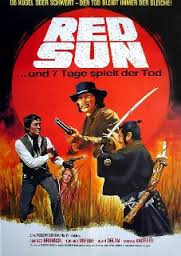
RED SUN
France/US, 1971, 114 minutes, Colour.
Charles Bronson, Alain Delon, Toshiro Mifune, Ursula Andress, Capucine.
Directed by Terence Young.
Red Sun is an average Western filmed in Spain. It seems to try to have it both ways at once; use all the conventions of the Western and then share in the mood of disillusionment with the West. Where the film differs from others is in its use of Toshiro Mifune as a Samurai in the West trying to recover a Japanese sword. The contrast of style, manners and personality of the non-hero, Charles Bronson, is quite striking. The film is bloodthirsty at times, offers discussion points, but is average entertainment. Young next made The Valacchi Papers with Bronson.
1. Was this was meant just to be a Western or was there some idea or even message behind it?
2. To what did the title refer?
3. The immediate setting was the brutal West - thieves, double-crossing, revenge? Did this picture of the West remain through the film?
4. How stereotyped was the character of the "hero"? Did you like him? What attractive facets of his personality were emphasised?
5. Was Gotch a conventional villain? Why?
6. Why was the Japanese in the West an unusual situation for a Western? Do you think it was a good idea?
7. How were you impressed by the Samurai as a man?
8. Comment on the differences between Eastern and Western cultures in the attitudes and behaviour of the gunman and the Samurai. Was one a better man than the other? By what standards?
9. What motivated the Samurai in his quest for the sword? How noble were his motives? Did he believe in honour and hari-kari?
10. What motivated the gunman? Did he have any sense of nationalism, pride and honour?
11. Why did the two become friends (or did they?)
12. Did the two understand each other? Did the gunman understand the Samurai's capacity for endurance? Did the Samurai understand the gunman's rugged individualism?
13. What role did Ursula Andress play in the film? Was she introduced merely for glamour and sex? What of the scene where the Indians leave her to die?
14. Were the Indians dragged in? What did they add to the film?
15. Was the last half-hour of the film too violent? Did you enjoy the Samurai's use of his sword for killing? Was the film too cruel?
16. Was it appropriate to the film that the Samurai should be killed? - or did this jar on you and affect the mood of the film?
17. How cynical was the ending of the film, considering the two who were left alive? Is this the kind of West that survived?
18. What picture of the West did the film give? Does it correspond with the usual images of the West?
Published in Movie Reviews
Published in
Movie Reviews
Tagged under
Saturday, 18 September 2021 19:24
Red Spider, The

THE RED SPIDER
US, 1988, 90 minutes, Colour.
James Farentino, Jennifer O'Neill.
Directed by Jerry Jameson.
The Red Spider is an interesting murder mystery telemovie, with fine New York settings. James Farentino is Daniel Malone, a detective asked to investigate the murder of several prominent people. A New York prostitute Is suspected.
There is good support from Jennifer O'Neill as a counsellor at law. There are sufficient twists :~-,and the dramatic final revelation of the murderer. There are connections with Vietnam, the fall of Saigon and the repatriation of troops as well as morale in the American forces.
Direction is by Jerry Jameson, director of many telemovies. Satisfying murder mystery.
1. Enjoyable thriller? Police detection work? New York?
2. The use of New York City, night and day, the streets, the military, the police precincts? 42nd. Street and the sleazy element of the city? Bars and apartments? Musical score?
3. The title, the murderer, the method of slashing the victims' throats, the sign of the red spider? Vietnam connections? North Vietnam? The connection with the murderer?
4. Did the author play fair with the audience, the crime, the investigation, the clue, the unmasking of the murderer? Sufficient indication?
5. Daniel Malone as detective, his work in New York, motivation, skills, contacts? With the counsellor, the clash, seeing her at work with the children, collaboration, his reliance on her for evidence at the end? To his superiors? The range of his investigations, Vietnam, the Chinese gangster,
the military? Discussions with psychologists? The final confrontation with Shaughnessy, the truth, the fight?
6. The counsellor, her experience, her husband in Vietnam, his death, clash with Malone, seeing him at work, giving -information, verifying his story of Shaughnessy's suicide?
7. Kate and her going undercover, her partner, her courage, investigations, being stabbed, recovery? Per partner and his concern?
8. The Chinese gangster, the attack, his anger, Malone putting out the rumour that he was giving information, the violence against him, his collaboration about North Vietnam?
9. The psychologists and their comments on the nature of the murders, on the murderer, schizophrenia?
10. Police work, the personalities of the detectives, Shaughnessy and his work, his wife, his connection, the revelation that he was the murderer, disguised as a woman, his motivation, the Chinese gangster and Kate? His story about Vietnam, the members of his unit, their leaving him behind, the torture, sexual abuse, his revenge?
11. How satisfying a murder mystery? New York? America and Vietnam? Violence?
Published in Movie Reviews
Published in
Movie Reviews
Tagged under
Saturday, 18 September 2021 19:24
Red Shoes, The
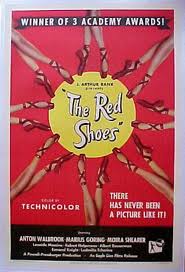
THE RED SHOES
UK, 1948, 136 Minutes, Colour.
Anton Walbrook, Marius Goring, Moira Shearer, Leonide Massine, Robert Helpmann.
Directed by Michael Powell and Emeric Pressburger.
The Red Shoes is considered a classic ballet film and was very popular in the late 40s. It made ballet very respectable on the cinema screen for wide audiences. Directors Emeric Pressburger and Michael Powell tried to repeat their success some years later with the presentation of The Tales of Hoffmann. Powell and Pressburger had worked together in many films, eg. A Matter of Life and Death. They were to make a number of war tributes in the 50s. Moira Shearer was a successful ballet dancer at the time and can be seen in The Tales of Hoffmann, The Story of Three Loves and other ballet films. Anton Walbrook had a fascinating power in the English cinema at the time for rather exotic, continental, fascinating men. Robert Helpmann, Leonide Massine and other successful ballet dancers of the time form the supporting cast. The film is interesting in presenting a ballet company at work, the Svengali-Trilby? story in a ballet context. The ballet music was written especially for the film by Brian Easdale.
1. The film is considered a ballet cinema classic. Why? Its skills, qualities, entertainment value? Parable value? The appeal of ballet, of dance, of music? The cinema making them more available for a wide audience?
2. The presentation of ballet in cinema form? The differences from theatrical performance? Skill, beauty, drama? How well did the ballet sequences blend with the drama of the film?
3. How well did the screenplay and the direction combine ballet, the drama of the overall film and the parallels with the heroine of the film and of the, ballet itself? The fable, tragedy?
4. A British film of the late 40s? The British atmosphere, Europe? The colour styles, the musical score, the choreography?
5. The basic plot of the film: the basic theatre story, the creator, his ambitions, his hold over the young star who is emerging, her ambitions and hopes, guidance, passion, the clash of the love story, tragedy? The material is fairly conventional. How well was it presented her? Did the film transcend the conventions and even the cliche?
6. Moira Shearer's beauty and skill as Vickie? The screenplay's focus on her and audience identification with her? An ordinary young girl, her character, hopes and ambitions, her background, her willingness to be guided, the hard work? The growing love for Julian Craster? The contrast of her relationship with him as with Lermontev? His hold over her, tyranny, mesmerising power? How did he eventually control her life? Could she have broken the spell?
7. Her growth in success, its effect on her? How were the theatre scenes balanced with the scenes with Julian? The build-up to jealousy in Lermontev?
8. Julian Craster as the talented young man, his hopes, work with Lermontev? The contrast of the two men? Julian's love for Vickie but his inability to hold her? Could he have saved her from tragedy?
9. Lermontev as the creative genius, his hypnotic power, jealousy, control? What did he live for? His cruelty in being the power behind the tragedy?
10. The supporting cast and their presentation of the ballet company, life within the company, frictions, joys, rehearsals etc.?
11. The contrast with the English atmosphere and the Riviera? The importance of the Riviera background for the climax of the film?
12. The beauty of the ballet, the way that Vickie danced it, its parallels with her life? The insight into character via the ballet? AS a fable lived out in real life?
13. The impact of Vickie’s death? What possessed her? The significance and reference of the title? Her passion and achievement?
Published in Movie Reviews
Published in
Movie Reviews
Tagged under
Saturday, 18 September 2021 19:24
Red Hot and Blue
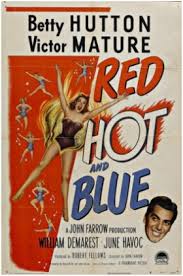
RED HOT AND BLUE
US, 1989, 84 minutes, Black and white.
Betty Hutton, Victor Mature, June Havoc, William Demarest.
Directed by John Farrow.
Red Hot and Blue is a Betty Hutton musical comedy. It is mainly for those who like the rather raucous comedienne. She starred at Paramount in a number of films in the late 1940s with a rather clown style, noisy, brash. This is one of those films. She made more impact with Fred Astaire in Let's Dance and in M.G.M's George Sidney production of Annie Get Your Gun. She was also in The Greatest Show on Earth and Somebody Loves Me with Ralph Meeker. This is a very brief gangster comedy: a young girl comes to New York, hoping to get on the stage, is romantically involved with a serious director (played in a rather subdued manner by Victor Mature) and boards with girlfriends, including June Havoc. By mistake she is witness to a murder and is pursued by gangsters, including composer (Guys and Dolls, Most Happy Fella) Frank Loesser who composed the songs for this film, including a comic version of Hamlet. Needless to say, everything works out in the end. The film is of interest as indicating the comic styles of these gangster musicals of the time, for the work of Betty Hutton, Victor Mature and William Demarest. Direction is by John Farrow who made so many action adventures with Alan Ladd in the '40s and a number of bigger budgeted features in the '50s.
Published in Movie Reviews
Published in
Movie Reviews
Tagged under
Saturday, 18 September 2021 19:24
Redhead and the Cowboy, The
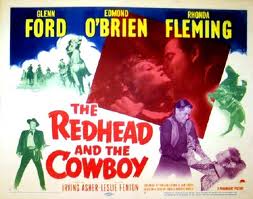
THE REDHEAD AND THE COWBOY
US, 1950, 90 minutes, \Black and white.
Glenn Ford, Edmond O'Brien, Rhonda Fleming, Alan Reed.
Directed by Leslie Fenton.
The Redhead and the Cowboy is one of the many programme features produced by major studios in the '40s and '50s. This film has fine Paramount production values. It is based on a story by Charles Marquis Warren, author of many westerns (and later director of similar films). Glenn Ford is an engaging hero, Rhonda Fleming a glamorous heroine. The film is a pleasant, if conventional, western.
1. An entertaining western? The aftermath of the Civil War?
2. The film as a programmer, production values, black and white photography, locations in New Mexico, editing and pace, action sequences, musical score?
3. The title and the focus on Gil and Candace? The background of the West? Expectations?
4. The aftermath of the Civil War, 1865, New Mexico, renegades from the various armies, the Copperheads? The espionage, the robbery plans, law and order and lawlessness?
5. Gil Kyle and Glenn Ford's amiable style, the cowboy after the Civil War, coming to the town, bushwhacked, involved in the plans for the robbery, his rescuing Candace and falling in love with her, the attack on the gold train, the villains brought to justice? The man of the West?
6. Candace and her work in the dance hall, carrying messages from the alleged forces? Espionage? Involvement, falling in love with Gil, being rescued by him?
7. Dunn Jeffers and his place in the West, cattle buyer, the armies, the robbery plans?
8. The picture of the false Confederate Army, the outlaw band, the plan to rob the gold train, the chases, the attacks? Their being called to justice?
9. The gallery of characters from westerns: the sheriff, Mr. and Mrs Barrett, Lamartine?
10. The American heritage of the West, the opening up of the territories, the establishing of law and order?
Published in Movie Reviews
Published in
Movie Reviews
Tagged under